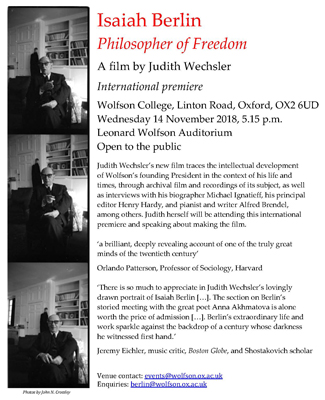Isaiah Berlin: Philosopher of Freedom
Premiered at Wolfson College, Oxford, on 14 November 2018, Judith Wechsler’s acclaimed documentary film on Berlin can now be viewed online here, using the case-sensitive password Liberty. The film is available for rental or purchase through The Circulating Film Library, The Museum of Modern Art, New York.

The poster announcing the premiere: click here for enlargement
Berlin on Europe, the EEC and the future
Extracts from letters (including those written in the 1970s as Britain first joined) and essays
‘I am fanatical about Europe simply because I think that we shall otherwise sink into political insignificance, economic straits and hideous provincialism, which is beginning already. Entering Europe will dislocate things in the short run and cause some misery, but staying out of it will ultimately turn us into Portugal or, at best, Sweden, which would be very sad. All the opponents, although ostensibly concerned about economic facts, standard of living, etc., are in fact possessed by fear and contempt for foreigners – England is far more isolationist than ever America was and this is a nervous condition preceding decline, inevitably it seems to me. I don’t believe that there will be a spring election, and I agree with you that the country is not ready to enter Europe, but neither was it ready for war against Hitler. It should have been, but the price is always much higher if one waits for slow processes.’
Building: Letters 1960–1975, pp. 444–5 (1971)
‘I am entirely in favour of entering the Common Market, but I have signed two manifestos already on this subject – one sent to me by Lord Gladwyn, the other by someone else whose name I cannot recollect – and do not think I can go on signing such documents, for fear of making myself ridiculous, nor do I think that it will make the faintest difference to Wilson, as he knows what intellectuals feel and could not care less, I think. [...] On second thoughts why shouldn’t I sign endless numbers of manifestos about the Common Market?’
ibid., 457 (1971)
‘Where are we to look for liberty, progress, the pursuit of happiness? I realise that this is exactly how people talked in, for example, 1810 – those who thought that the real Europe was before 1789 decided in 1810 that Europe was dying, if not dead; but it was in fact entering upon one of the most vigorous periods of its existence. And so it may be now. All I am saying is merely the function of age and habits of thought formed too long ago. So we must gird ourselves for the new world and will it to be grist to some new mill, with which we must identify ourselves. I do not really know what this means in practice, but I am sure it is the right attitude, rather than jeremiads over what cannot be restored.’
Affirming: Letters 1960–1975, p. 29 (1976)
‘Jerusalem and Athens are the twin roots of European civilisation; they are the greatest trees, the most powerful pillars on which it rests.’
ibid., p. 583 (1997)
‘England cannot really enter into European Union – economically it halves the standard of living and nobody is or is really capable of being psychologically prepared for it at all – American opinion may be annoying but it is real; its influence may be resented, but it is allowed for, whereas the French and Italians hardly exist and mean nothing at all to the man in our street, who thinks he likes them better, but only because they are much, much remoter.’
Enlightening: Letters 1946–1960, p. 145 (1949)
‘[H. H. Joachim] represented a combination of moral purity and strength and exquisite European culture which by merely existing creates standards and humanises its surroundings’.
Flourishing: Letters 1928–1946, p. 275 (1938)
‘Terrible though the price may have been, one of the consequences of Hitler’s invasion and attempted organisation of Europe was the destruction of old barriers, which has been a strong factor in making European union – economic, and in the not too distant future perhaps political too – not only possible but probable.’
‘A Note on Nationalism’ (1964)
‘[J. G. Hamann] is the forgotten source of a movement [irrationalism] that in the end engulfed the whole of European culture.’
The Magus of the North (1993), introduction, closing words
